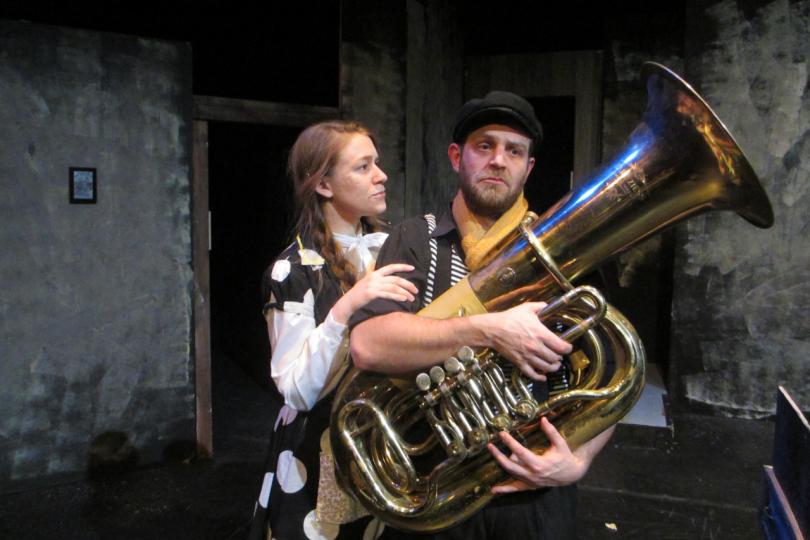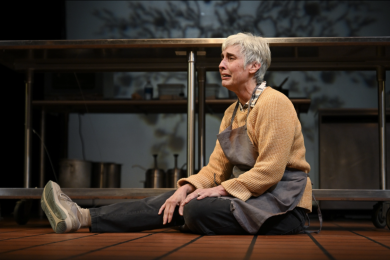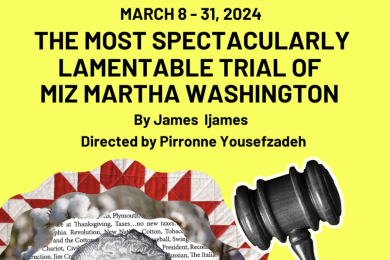Finding a point in pointlessness

We are living in a crazy time, so it makes sense why so many companies are producing plays to tap into that. In this era of political shifts and social threats, it would also make sense if local plays start getting more absurd. So when a thick Slavic accent told us to “terminate” our cellular devices as the light went down in the new Crane Theater the other night, it made sense: we’d be taking a ridiculous ride though communist Russia. Cue the government commentaries.
Theatre Pro Rata’s Goodbye Cruel World looks into a soviet man’s life and dance with death. Its lead, Semyon Semyonovich, is unemployed and struggling with losing his place as head of household while his wife provides for them (could be funny; I found it problematic). When he says in passing that he wants to shoot himself, word gets out, and archetypes from all over Moscow show up to vie for a spot in his suicide note. Artists, members of church and state, and the intellectual elite all try to convince him to die for their causes.
Chosen during a script-reading series hosted by Pro Rata, Robert Ross Parker’s play probed at where government conditions can push people. It also got a few laughs that were heightened by our current Russian relations. Despite these ties to today, it was clearly a play written for broader purposes, and Andrew Chambers’ production did little to bring it closer.
Lost in the chaos
The play chugged along like a sturdy machine, carrying acceptable performances and jokes but rarely slowing down enough for us to breathe or speeding up enough for our hearts to race. Derek Meyer played Semyon, Elizabeth Efteland his empathetic wife and Katie Kaufmann her mother, all of them also playing other characters. The flatness of the storytelling gave them nowhere to go. The actors seemed like they could do more with the right material, but their lack of freedom made the performances less engaging even as the crazy level climbed.
The design also suffered from these traps. Mandi Johnson’s costumes flecked polka dots and stripes among the cast’s clothing, and Jon Kirchhofer’s lighting brought out Theatre Pro Rata’s red and black aesthetic. Though executed cleanly, the designs made the show seem more like a gimmick than thematically sound — more a fault of the overall storytelling than anything.
For a while, the machine seemed to lead somewhere, which didn’t make sense because it did not go much of anywhere. When the novelty of the funny accents and kooky visuals wore off, we had a story that seemed pointless underneath. I guess that’s the point of ridiculous stuff like this: pointlessness. But somewhere in the commotion, even the point of the pointlessness got lost.
A trace of humanity
The silliness had a human touch when Semyon gathered with his new “friends” — all of the people wanting to claim his death. As they drank and made speeches in the hour before his planned suicide, Semyon discovered he might have something to live for after all. The arrival of these interesting people who wanted him dead made him want life.
Then they stood together and sang a song, prematurely mourning a death they all were hoping for. It was absurd, but also touching. For a second, these zany characters got some empathy.
Depending on how our political situation goes, we could be seeing more plays like this. If that’s true, I hope they are courageous; so absurd that the lack of meaning hits home. Or a little absurd but underneath, really emotional and powerful. Either way, I hope they don’t hover somewhere in the middle. This play did. It was a solid attempt at joining the conversation in this style, but it struggled to get past the roadblocks that style created.
Should we lose hope just yet? We have a long way to go in this crazy time, and there’s work, with a point, to be done.
And if theater makers want to do this kind of show anyway, maybe it’s time to re-examine what makes these kinds of shows great, and what about our society they can truly bring out.


